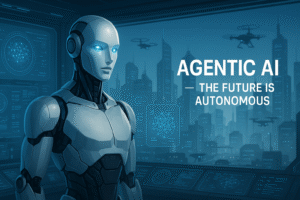Introduction to Agentic AI
Agentic AI refers to autonomous artificial intelligence systems designed to act independently, adapt in real-time, and solve complex, multi-step problems based on context and predefined goals. Unlike traditional AI, which often requires human supervision or rigid programming, agentic AI exhibits true autonomy, proactively making decisions and taking actions without constant human input.
It goes beyond generative AI—which primarily creates content based on learned patterns—by applying that content purposefully to achieve specific objectives. Essentially, agentic AI is a goal-driven intelligence that thinks, plans, and acts like a digital decision-maker, continuously adapting to changing environments and outcomes.

Core Characteristics and Capabilities
Agentic AI systems possess several defining features:
- Autonomous Action and Decision-Making: They operate without step-by-step human guidance, initiating and managing tasks independently within their environment.
- Environmental Perception: These systems gather and interpret data from diverse sources such as APIs, sensors, and databases, enabling situational awareness.
- Reasoning and Strategic Planning: Agentic AI breaks down large, complex problems into manageable subtasks, applying iterative reasoning to refine decisions and plans.
- Continuous Learning and Adaptation: Through feedback loops and reinforcement learning, they improve their performance and adjust strategies dynamically as conditions evolve.
- Agentic AI-Collaboration: Agentic AI can work alongside humans and and other AI agents, enhancing problem-solving capabilities through coordinated efforts.
How Agentic AI Works
The architecture of agentic AI typically involves multiple AI agents working collaboratively, with each specializing in subtasks that contribute to the overall goal. These agents leverage advanced technologies such as large language models (LLMs), machine learning, reinforcement learning, and deep learning.
Reinforcement learning plays a crucial role by enabling the system to learn from trial and error, optimizing decisions based on rewards and penalties in real-time. This iterative process allows agentic AI to adapt and improve autonomously.
Moreover, agentic AI integrates generative AI capabilities. It doesn’t just generate content, but uses that content to execute goal-oriented tasks. For example, an agent might generate a travel itinerary and then autonomously book flights and hotels, seamlessly combining content creation with action.
Real-World Applications and Use Cases
Agentic AI is transforming industries by automating complex workflows and business processes with minimal human intervention. Key applications include:
- Enterprise Automation: Managing end-to-end business functions such as supply chain optimization, customer support, and financial operations autonomously.
- Business Process Optimization: Intelligent systems that anticipate needs, optimize workflows, and proactively flag issues before they escalate.
- Specific Use Cases: Autonomous travel booking, accelerating scientific discovery, enhancing cybersecurity defenses, and automating software development tasks.
These applications demonstrate agentic AI’s ability to handle unstructured environments and multi-step challenges that traditional automation cannot.
Benefits Over Traditional AI and Automation
Agentic AI represents a paradigm shift from rule-based, deterministic systems like Robotic Process Automation (RPA), which follow fixed instructions and lack adaptability. In contrast, agentic AI:
- Acts proactively rather than reactively.
- Adapts fluidly to changing environments and complex scenarios.
- Solves multi-step problems autonomously without constant human oversight.
This results in greater efficiency, scalability, and the ability to automate sophisticated workflows that were previously impossible to handle autonomously.
Challenges and Considerations
Despite its promise, agentic AI faces several challenges:
- Current Limitations: Most agentic AI systems today are specialized and limited in scope for safety and usability. Fully autonomous, general-purpose AI remains a theoretical goal.
- Ethical and Safety Concerns: Autonomous decision-making raises questions about accountability, transparency, and control, requiring robust governance frameworks.
- Human-AI Collaboration: Ensuring responsible deployment involves maintaining human oversight and collaboration, balancing autonomy with ethical considerations.
Addressing these challenges is critical to unlocking the full potential of agentic AI while minimizing risks.
The Future Outlook
Agentic AI is poised to revolutionize intelligent systems and enterprise operations by delivering end-to-end autonomous solutions. Ongoing research focuses on:
- Enhancing multi-agent ecosystems where AI agents collaborate seamlessly.
- Integrating with emerging technologies like IoT, robotics, and blockchain.
- Developing explainable and ethical AI frameworks to ensure transparency and fairness.
- Augmenting human capabilities through effective human-AI partnerships.
As these advances unfold, agentic AI will become increasingly intuitive, effective, and adaptive, reshaping industries and society.
Conclusion
Agentic AI represents the next frontier in artificial intelligence—a transformative technology that empowers machines to act independently, learn continuously, and solve complex problems with minimal human intervention. Its ability to deliver autonomous, goal-driven solutions is redefining automation and intelligent systems across various sectors. Staying informed about agentic AI’s developments and implications is essential for businesses and professionals aiming to lead in an AI-driven future.
